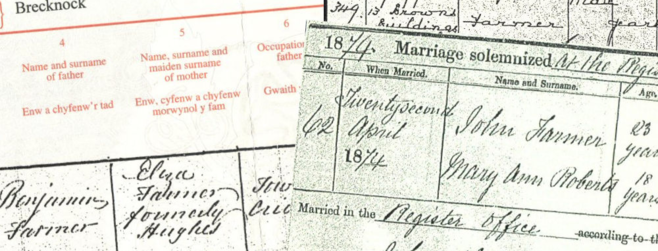Events During Benjamin Farmer's Lifetime
Benjamin Farmer was born in 1748 and died in 1821. On the previous page we learnt about his life, but what moments in History did he witness, what new scientifice discoveries were made, and what technology came in to being during his lifetime? Here I try to give some historical context to Benjamin's lifetime.
1751 - England was in the middle of an alchol crisis in regards to Gin, as satirised in the picture "Gin Lane", and this led to the Gin Act of 1751.
1752 - On the 2nd September Benjamin went to bed and woke up on 14th September. This was when Britain stopped using the Julian Calendar and adopted the Gregorian Calendar instead.
Also in 1752, Benjamin Franklin invented the Lightning Rod, and the Liberty Bell arrived in Philedelphia.
1753 - The British Museum was established by English Parliament, but the Museum itself wouldn't open for another six years.
1754 - The French and Indian War began in America. Joseph Black discovered Carbon Dioxide.
1755 - Samuel Johnson published his "Dictionary Of The English Language".
1756 - Britain declared war on France and The Seven Years War began. The Black Hole Of Calcutta incident occurred. Wolfgang Amadeus Mozart was born in Austria.
1759 - Candide was published by Voltaire. Josiah Wedgwood set up his pottery business. The Royal Botanic Gardens were established at Kew.
1760 - George II Died and his Grandson, George III, became King.
1762 - Catherine The Great became ruler of Russia.
1763 - The Seven Year War ended with the signing of the Treaty Of Paris.
1765 - James Hargeaves invented the Spinning Jenny.
1766 - William Pitt "The Elder" became Prime Minister. Henry Cavendish discovered Hydrogen.
1767 - Joseph Priestley invented Carbonated Water.
1768 - Captain James Cook set sail aboard the Endeavour on his first Pacific voyage. Philip Astley staged the first modern circus. The Encyclodpedia Britannica is published.
1770 - Captain James Cook arrived in Botany Bay. Louis XVI married Marie Antoinette.
1771 - Richard Arkwright set up the first water-powered textile mill at Cromford Mill.
1772 - Captain James Cook set sail on his second voyage. The legal case of slave, James Somerset, set in motion the abolution of slavery in Britain. Carl Wilhelm Scheele discovered Oxygen. Daniel Rutherford identified Nitrogen.
1773 - Captain James Cook crossed the Antartic Circle and circumnavigated the continent. The Boston Tea Party protest occurred in America. David Bushnell invented the "Turtle", the world's first working submarine.
1774 - Carl Wilhelm Scheele discovered Chlorine.
1775 - The American Revolutionary War began with battles in Lexington and Concord. A 10-year old Pierre-Simon Girard invented a water turbine.
1776 - The "Declaration of Independence" was signed on 4th July. Edward Gibbon published "The History Of The Decline And Fall Of The Roman Empire".
1778 - Captain James Cook set out on his third voyage.
1779 - Captain James Cook died after a dispute with Hawaiian natives. Jan Ingenhousz discovered photosythesis in plants. Samuel Crompton invented the spinning mule. Aimé Argand invented the Argand oil lamp. Construction was started on the first all-iron bridge at Ironbridge in Shropshire.
1781 - The British were defeated by George Washington and his men at Yorktown. William Herschel discovered Uranus.
1783 - The Icelandic volcano Laki erupted causing widespread famine and death across Europe including Britain. The Treaty of Paris ended the American War of Independence. The first manned hot air balloon flight was taken by the Montgolfier Brothers in Paris, closely followed by the first manned flight in a hydrogen gas balloon invented by Jacques Charles and Nicolas-Louis Robert. William Pitt "The Younger" became Prime Minister.
1784 - Joseph Bramah patented his unpickable security lock.
1785 - Edmund Cartright invented the power loom. Andrew Meikle invented the threshing machine.
1787 - American inventor John Fitch successfully sailed his steamboat "Perserverance" on the Delaware River. A few months later William Symington demonstrated his paddle steamer, and James Rumsey experimented with a jet-propelled boat. The British Society for the Abolition of the Slave Trade was established. The "First Fleet" of settlers (including 778 convicts) set sale for New South Wales, Australia.
1788 - The First Fleet landed in Port Jackson, and created te settlement that later became Sydney.
1789 - George Washington was elected the first President of the United States. Fletcher Christian led a mutiny against Captain Lieutenant William Bligh aboard HMS Bounty. The Bastille in France was stormed signalling the beginning of the French Revolution.
1791 - The Semaphore telegraph was invented in France by Claude Chappe. John Barber patented the gas turbine. William Gregor discovered Titanium. The Brandenburg Gate in Berlin was completed. Vitus Jonassen Bering discovered Alaska. Mozart premiered the Magic Flute in Vienna, he died several months later in the same year.
1792 - William Murdoch invented gas lighting and his house in Cornwall became the first gas-lit house. Tipu Sultan used the first iron-cased rockets in Mysore against the British.
1793 - Louis XVI of France and his wife Marie Antoinette were executed by guillotine. The reign of terror in France began under the leadership of Maximilien Robespierre. Eli Whitney invented the cotton gin in America. Diego Marín Aguilera flew his glider.
1794 - France abolished slavery. Maximilien Robespierre is guillotined.
1795 - Nicholas Appert invented the food-preserving jar. Georges Cuvier found fossil bones and identified them as belonging to a huge extinct reptile. Joseph Bramah patented his hydraulic press. A meteorite fell on Wold Newton, Yorkshire.
1796 - Edward Jenner completed the first documented inoculation against smallpox. Napoleon Bonaparte took charge of the French army.
1797 - John Adams became President of the United States. Composer Franz Schubert was born. Thomas Bewick published the first volume of his "History Of British Birds".
1798 - Napoleon was defeated by Horatio Nelson at the Battle of the Nile. Theobald Wolfe Tone and the Society of United Irishmen attempted a revolt against British rule.
1799 - The Rosetta Stone was found by French soldiers in Egypt. Tipu Sultan, ruler of Mysore was killed during the Fourth Anglo-Mysore War.
1800 - Alessandro Volta invented the "wet cell" battery. William Nicholson and Anthony Carlisle discovered electrolysis. William Herschel discovered infrared radiation. Henry Maudslay developed the screw-cutting lathe. Yeast was used for the first time in fermenting beer.
1801 - The Act of Union between Britain and Ireland came into effect. Thomas Jefferson became President of the United States. Ludwig van Beethoven finished composing the Moonlight Sonata. Richard Trevithick tested his steam road locomotive, "Puffing Devil" in Cornwall.
1802 - The Treaty of Amiens was signed by Britain, France, Spain and the Netherlands ending ongoing warfare.
1803 - Britain declared war on France and the Napoleonic wars started. William Symington's "Charlotte Dundas" became the first practical steamboat. The elements Rhodium, Palladium, Osmium, Iridium, and Cerium were discovered.
1804 - Napoleon was declared Emperor of France. Pitt "The Younger" became Prime Minister again. Thomas Telford began work on the Caledonian Canal. The Lewis and Clark expedition began.
1805 - France and Spain were defeated by Horatio Nelson's fleet at the Battle Of Trafalgar, During the battle Nelson was mortally wounded, and died before the action was over.
1806 - Ralph Wedgwood patented carbon paper.
1807 - Britain passed the Slave Trade Act and abolished the slave trade in all of its territories. This was mainly due to the efforts of William Wilberforce and his supporters.
1808 - Spain and Portugal joined forces with Britain against France and the Peninsular War began.
1809 - Arthur Wellesley lead Britain to victory at the Battle of Talavera.
1810 - Humphry Davy demonstrated the arc lamp - the first electric light. Peter Durand patented the tin can.
1811 - George IV became Prince Regent due to George III's mental health. Luddites wrecked new machinery in textile mills across the North of England. Mary Anning, aged 11, found her first key fossil - an ichthyosaur.
1812 - Britain began to seize American ships trading with France, triggering the War of 1812. The first steam train ran on the Middleton Colliery line. The first steamboat service opened on the River Clyde with the paddlesteamer PS Comet. Margaret Ann Bulkley became the first woman to qualify as a Doctor after choosing to live as a man named James Barry in order to be accepted into University.
1813 - William Hedley patented his steam locomotive, "Puffing Billy".
1814 - Napoleon was captured in Paris and exiled to the island of Elba. Louis XVIII became King of France. George Stephenson built his first steam locomotive, "Blücher". Eli Terry created the first mass-produced clock.
1815 - Napoleon rallied supporters and returned to France, causing Louis XVIII to flee. The Hundred Days began until Napoleon was defeated at the Battle of Waterloo by the Duke of Wellington. Napoleon was exiled a second time to the island of St. Helena. Humphry Davy invented the miner's safety lamp. The most powerful eruption in recorded history occurred when Mount Tambora on the Indonesian island of Sumbawa erupted with the explosions heard up to 1,616 miles away.
1816 - Shaka became King of the Zulus. René Laennec invented the stethoscope.
1817 - The New York Stock Exchange was founded. David Brewster patented the kaleidoscope.
1818 - Baron Karl von Drais de Sauerbrun invented the "Dandy Horse", a precursor to the bicycle. James Blundell carried out the first successful blood transfusion. Mary Shelley publishes her novel, "Frankenstein". Robert Stirling invented the Stirling engine.
1819 - The city of Singapore was established. The Peterloo Massacre occurred in Manchester. William Parry found the Northwest Passage. SS Savannah became the first steamship to cross the Atlantic Ocean. Captain John H. Hall developed the M1819 rifle.
1820 - George IV became King of England.

